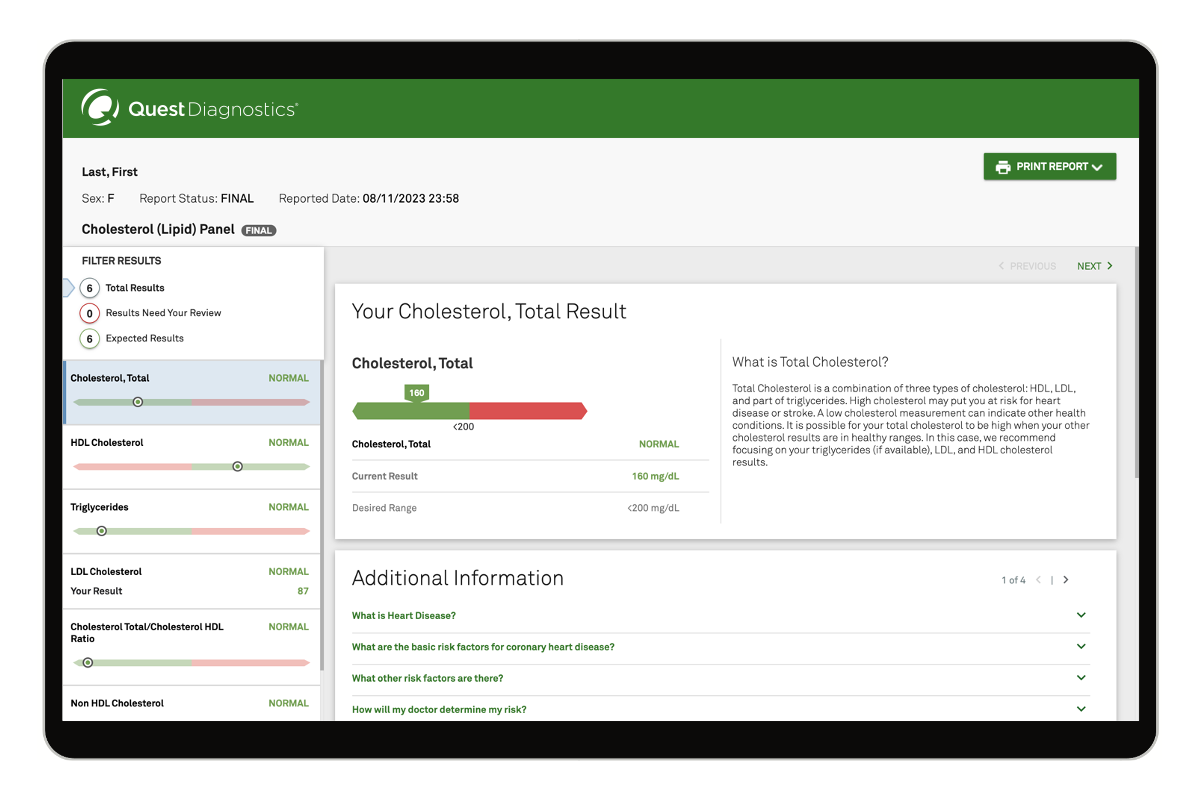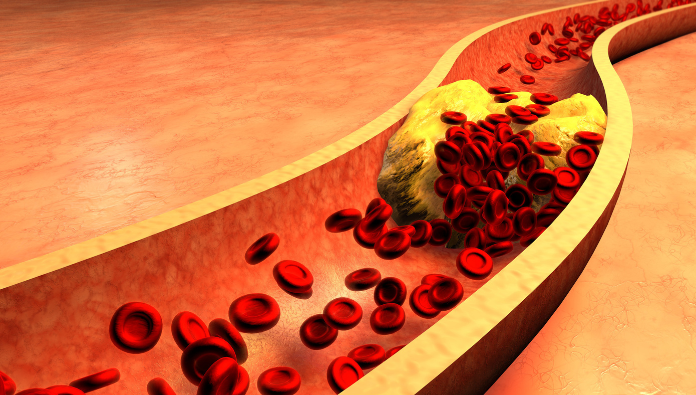Cholesterol (Lipid) Panel
This cholesterol lipid panel test measures specific lipid levels of your blood to help assess risk for heart disease, heart attack (or stroke), and other diseases of the blood vessels. Read moreThis lipid panel (or lipid profile) blood test measures your cholesterol and triglycerides levels to assess your risk for cardiovascular diseases. The lipid profile test works by measuring total cholesterol, triglycerides, HDL, LDL, cholesterol/HDL ratio, and non-HDL. Regular lipid panel testing plays a key role in maintaining both general and cardiovascular health. If the results show you have higher than normal levels of cholesterol, you and your healthcare provider can work together to determine next steps.
Buy your own lipid panel test online with Quest. No doctor’s visit is required – simply purchase lipid profile testing, visit a nearby Quest® location for sample collection, and get fast results.
Compare Tests
And find the right tests for you.
| Test For |
Cholesterol (Lipid) Panel |
High-Risk Heart Health Lipid and Lp(a) Test Panel |
Total Cholesterol Test |
|---|---|---|---|
| Total cholesterol | |||
| Low-density lipoprotein (LDL) (calculated) | |||
| High-density lipoprotein (HDL) | |||
| Triglycerides | |||
| Cholesterol/HDL ratio (calculated) | |||
| Non-HDL cholesterol (calculated) | |||
| Lipoprotein(a) | |||
|
$59.00
|
$85.00
Learn More
|
$39.00
Learn More
|
Cholesterol (Lipid) Panel |
High-Risk Heart Health Lipid and Lp(a) Test Panel |
Total Cholesterol Test |
|---|---|---|
| Total cholesterol | ||
| Low-density lipoprotein (LDL) (calculated) | ||
| High-density lipoprotein (HDL) | ||
| Triglycerides | ||
| Cholesterol/HDL ratio (calculated) | ||
| Non-HDL cholesterol (calculated) | ||
| Lipoprotein(a) | ||
|
$59.00
|
$85.00
Learn More
|
$39.00
Learn More
|
How it works
questhealth.com offers 100+ consumer-initiated Quest Diagnostics lab tests to empower you to have more control over your health journey. Choose from a variety of test types that best suit your needs.
Total Cholesterol: This measures the total amount of cholesterol found in your blood. The cholesterol is bound to low-density lipoprotein (LDL) and high-density lipoprotein (HDL) as it moves through the blood.
Low-density lipoprotein (LDL): LDL, often called "bad" cholesterol, transports cholesterol throughout your body to the cells that need it. Too much LDL can make cholesterol build up in your arteries, making them narrow and stiff, or blocking them, which makes it more difficult for blood to flow.
High-density lipoprotein (HDL): HDL, which is often called "good" cholesterol, picks up extra cholesterol that is circulating in the blood and takes it back to your liver so it can be removed from your body.
Triglycerides: Triglycerides are fats that are formed from foods such as oils, dairy, and red meat. These fats get converted into triglycerides and are stored away in fat cells to be used when needed. High levels of triglycerides can lead to hardening and thickening of the arteries.
• People age 20 or older who are at low risk for cardiovascular disease should have their cholesterol checked every 5 years
• People with cardiovascular disease risk factors should be checked more frequently
• High blood pressure
• High cholesterol levels
• Diabetes mellitus
• Obesity
• High-fat diet
• Sedentary lifestyle
• Tobacco use
Your healthcare provider can help you determine your risk factors for developing heart disease.
CDC website:
1Cholesterol. cdc.gov/cholesterol/index.htm
Getting your cholesterol checked. cdc.gov/cholesterol/cholesterol_screening.htm
LDL and HDL cholesterol: "bad" and "good" cholesterol. cdc.gov/cholesterol/ldl_hdl.htm
How and when to have your cholesterol checked. cdc.gov/cholesterol/checked.htm
*Heart and Stroke Statistics https://www.heart.org/en/about-us/heart-and-stroke-association-statistics




